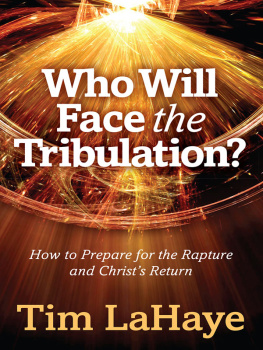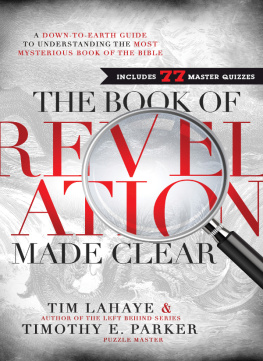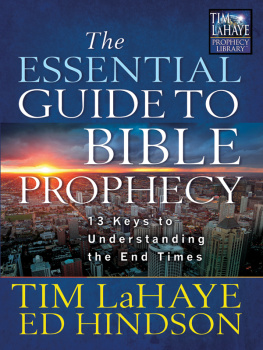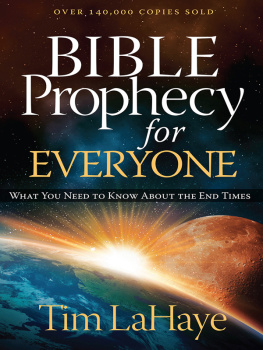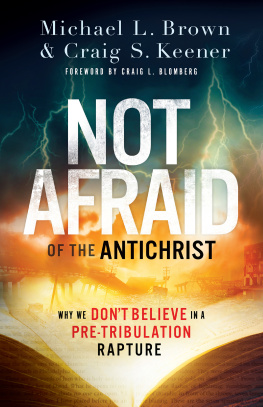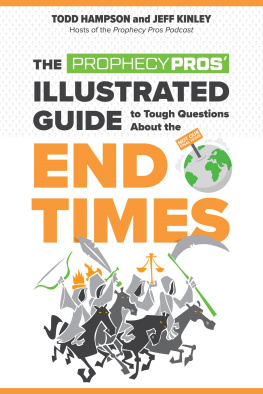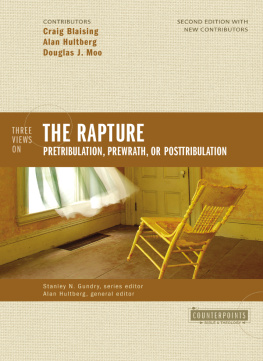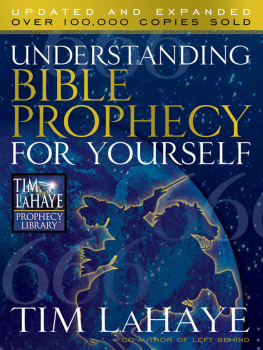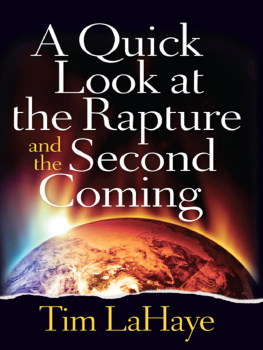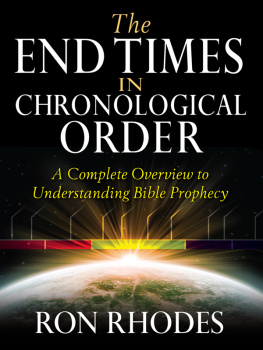No author is a creative island unto himself. We are all influenced by others, sometimes consciously and at other times unknowingly. The following are individuals and groups that I know influenced me in the writing of this book, to whom I wish to express my heartfelt gratitude.
The authors I quote and those in the bibliography
Most of all, my wife, Beverly, who graciously endured my mental preoccupation during the writing of this book
The many who corresponded with me on the subject and sent material:
Dr. James Combs, Springfield, Missouri
Dr. Thomas Ice, Arlington, Texas
Dr. David Allen Lewis, Springfield, Missouri
Dr. Richard Mayhue, Sun Valley, California
Dr. Ray Stedman, Palo Alto, California
Dr. Robert Sumner, Murfreesboro, Tennessee
Tricia Tillin, Derbyshire, England
And finally, Harvest House Publishers, for publishing the book and making it available to the Christian community
( Our Hope Magazine, August 1950, 86-88)
I n the Bible, the word rendered from is from the Greek preposition ek. It has various connotations that denote exit out of or separation from something with which there has been connectionfrom a place, from the midst of a group, from a condition or state, etc. The preposition is used twice in John 17:15, once denoting out of, and once from (while still, as it were, in the presence of): I pray not, our Lord says to the Father in His intercessory prayer, that thou shouldest take them out of [ek] the world, but that thou shouldest keep them from [ek] evil ( KJV ). Thus it may be seen that the post-Tribulationists have a point of argument for their view of Revelation 3:10.
Having said this much, however, suppose we examine more fully the preposition, the text, and the context.
Regarding the preposition ek, which is used over 800 times in the New Testament, only once can we find an instance where it is actually rendered through. That is in Galatians 3:8, through faith ( KJV ) where the obvious sense is by.
Ek is rendered out of hundreds of times, as for example: Out of Egypt I called My Son (Matthew 2:15); first cast out the beam out of thine own eye (Matthew 7:5 KJV ); for out of the heart proceed evil thoughts (Matthew 15:19); [many bodies of the saints] came out of the graves after his resurrection (Matthew 27:53 KJV ); I will spew thee out of my mouth (Revelation 3:16 KJV ); etc.
We have traced the preposition ek, when translated from, 150 times in the New Testament, to find no more than five occasions when it could possibly denote through or in, and only in one instance (its second use in John 17:15, to which we have already alluded) in the exact sense that the post-Tribulationists suggest for Revelation 3:10. The usual Greek for through is dia, and for in is en, eis, eip, and kata. It would seem that, if the Spirit of God intended to convey to the readers of this passage that the Lord would keep His own through or in the hour of trial, He would have used dia, or eis, or epi, or kata and not ek, which surely implies out of rather than through or in.
It is helpful to observe the text itself as well. Those to whom the Lord is speaking are said to have kept the word of my patience (Revelation 3:10 KJV ), an expression that suggests, at least, patient waiting for Him. And the Lord direct your hearts into the love of God, and into the patient waiting for Christ (2 Thessalonians 3:5 KJV ). For we know that the whole creation groaneth and travaileth in pain together until now. And not only they, but ourselves also, which have the first fruits of the Spirit, even we ourselves groan within ourselves, waiting for the adoption, to wit, the redemption of our body.But if we hope for that we see not, then do we with patience wait for it (Romans 8:22-25). The redemption of the body will be at Christs coming, and we who wait for Him are keeping the word of His patience.
It is important to note that it is not simply the temptation, or tribulation, that our Lord promises to keep His own from, but it is the hour of temptation, which shall come upon all the world (Revelation 3:10 KJV , emphasis added). While it may be proposed that the Lord can keep His own from trial simply by keeping them safely through it, it does not seem this can be stated with equal force in regard to the hour of temptation that the whole world will experience. The hour itself must be lived through by all who are in the world contemporaneous with it, when the only way that one can be kept from that hour is to be taken out of the world when it strikes.
Examine the last clause of Revelation 3:10: to test those who dwell on the earth. Those who are to undergo this tribulation, those who dwell on the earth, comprise a class of people that is referred to in such a way or by kindred expressions throughout the book (Revelation 6:10; 8:13; 11:10; 12:12; 13:8,12,14; 14:6; 17:2,8), and that is entirely earthly in its thinking and in no way whatever a heavenly people. There is not the slightest suggestion that the Lords blood-purchased church must remain here for that experience, even as a protected spectator.
Finally, the context suggests that Christs keeping of those who have kept the word of His patience from the hour of temptation will be out of it, called upward by His rapture shout; for the next verse declares, Behold, I come quickly: hold fast which thou hast, that no man take thy crown ( KJV ). Such a crown will be a form of reward, and when our Lord comes, He will reward His own. One of His last messages from heaven was this: Behold, I come quickly; and my reward is with me, to give every man according as his work shall be (Revelation 22:12 KJV ).
I t has long bothered me, and probably many other Christians, that so much disunity has arisen regarding the timing and events associated with our Lords return. Of all the teachings in the church, this second-most-frequently mentioned truth ought to be a unifying source of joy and blessing. Instead, it has become a divisive issue in the body of Christ. It is a sad commentary on the church that some Christians have been critical and intolerant because they disagree on this subject. Only the devil gains victory by such attitudes, which tend to retard rather than promote sanctification, evangelization, and world missions.
It is my hope that future disagreements can be resolved in a spirit of love and respect so that, as we draw closer to the actual fulfillment of these events, we might be of one mind. As I like to facetiously remind my mid- and post-Trib friends, their views do not determine their participation in the Rapture. When our Lord shouts from heaven, we all will rise at the same time! He will not selectively shout, All you pre-Tribbers, come up here. He is coming according to His time schedule, not ours, and when He calls, all Christians go at the same time to be with Him forevermore.
These differences of opinion probably arise because not all Christians adhere to the two keys to understanding the prophetic Word of God. First, one must interpret the Bible literally unless the context provides good reason to do otherwise. Second, we must understand that Israel and the church are distinct! They had different beginnings, purposes, and commissions, and they have different futures. If a person fails to acknowledge these two facts of Scripture, all discussion and argument is fruitless. The issue is not so much ones view of prophecy as it is ones view of Scripture and the church.
Verbal Inspiration
The Bible was written for all people to understand, not for theologians to wrangle over or to use as raw material from which to develop comprehensive systems of theology. Some teachers seem to view Scripture as a servant to their theology rather than vice-versa. The Bible says that all Scripture is given by inspiration of God, and is profitable for doctrine, for reproof, for correction, for instruction in righteousness (2 Timothy 3:16). Thus the Bible is unlike any other book. Historically, whenever the Bible is not accepted as inspired, authentic, and accurate, it has been twisted to mean anything the interpreter desired. To avoid that problem, we must take Scripture passages literally in context whenever possible.
Next page
